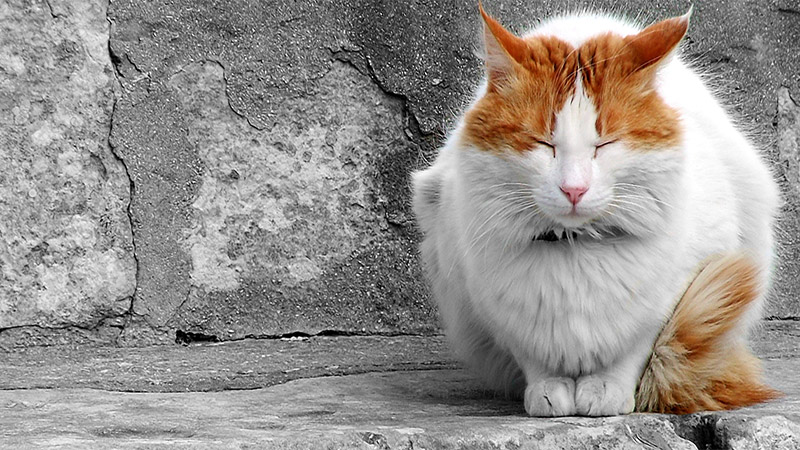Cats are natural predators and don't like to show any pain or illness. These pets are good at hiding their pain. As a cat gets older, she becomes weak and weak. Aging is normal, but the pain and weakness are not. There are many health issues that your cat faces while getting older. As good pet parents, it's your responsibility to help your kitty age gracefully by spotting any potential problem as soon as possible. Some common health problems related to older cats are discussed below:
Related Topics You Might Like:
Products Related To Topic
"(Paid Links)" ▶ As an Amazon Associate, We earn from qualifying purchases.
Common health problems in older cats

Arthritis
It is a degenerative joint disease. In this painful condition, the joints wear away cartilage until the bone rubs against the bone. It may be genetic or can occur by an old fracture that didn't heal properly. If your cat is obese, this can provoke even more pain due to the additional support needed.
Symptoms of arthritis in a cat include a hesitation to go up and down the stairs. If you presume your kitty has painful joints, you can make sure she has easy access to the litter box. Although there's no cure for arthritis, your vet can help you find ways to reduce and manage the pain.
Kidney Failure
It is a prevalent health problem in older cats. The definite cause is unclear; some vets say that high blood pressure and other illnesses such as hyperthyroidism can lead to kidney failure. Kidneys are essential organs responsible for healthy elimination functions.

The primary function of these organs is to remove waste from the body. They also control blood pressure and make hormones. Cats are diagnosed with two types of kidney failure: acute and chronic.
Acute kidney
Acute kidney failure is caused by ingesting poisons such as antifreeze or toxic plants. But usually, the chronic type of kidney failure affects older cats. SCat with kidney problems often shows changes in bathroom habits and excessive thirst. Your veterinarian will check your cat and make suggestions based on your pet's condition and history. Annual blood work and urine testing are vital for early screening and detection of trends that may indicate early kidney disease. If diagnosed early, your vet may help save your cat years on his/her life and increase the quality of those years.

Hyperthyroidism
The thyroid is a small gland in the back of the throat that controls metabolic functions and affects your cat's energy level. When it is overly secrets thyroid hormones, it can destroy your pet's health. It's pretty standard in older cats. This hormone inequality often causes loss of weight in cats and becomes wildly overactive.
It can make them excessively thirsty and shed more than usual. Your cat will feel hungry all the time. The signs are similar to many other age-related disorders. Your vet can ask for a series of tests to check the hormone disproportion in your cat. Its treatment includes regular medication to keep the hormones in balance.
High Blood Pressure
high blood pressure is standard in cats, and it's serious if left untreated. It is also known as hypertension. It affects your cat's organs and causes illnesses, blindness, and other severe conditions. It is often associated with other diseases so getting at the source is essential. Your vet will recommend medication or a diet change, or both according to your condition.
Dental Disease
This disease is also common in aging cats. Plaque is responsible for dental issues and can lead to gum disease. Its symptoms include bleeding gums, red or swollen gums, and terrible breath. Stomatitis is a kind of dental disease that produces swelling and ulcers in the mouth.

As you can imagine, it's pretty painful and can prevent your cat from eating. Its treatment ranges from steroids to antibiotics to tooth removal - the most dreadful course of action. There are cat toothbrushes and flavored toothpaste for your pet's oral health and to prevent her from dental diseases.
Cancer
It is an insidious disease, and there are many different types of cancer in cats. One of the most prevalent forms is lymphoma which causes swelling in the lymph nodes. If you notice any abnormal lumps or bumps while petting your cat, this could be a sign of cancer. Cats tend to get a gastrointestinal form more commonly. It can show chronic diarrhea/loose stool, weight loss, and vomiting.
It's also helpful to know that cats are excellent at covering up illness. Take your older cat to the vet twice a year for monitoring and share any behavioral changes you may have noticed. The quicker you can detect a health problem, the better your chances of slowing its progress. Other signs of pain/disease can be lethargy, not grooming, hiding more often, urinating/defecating outside the litter box, becoming more aggressive.

